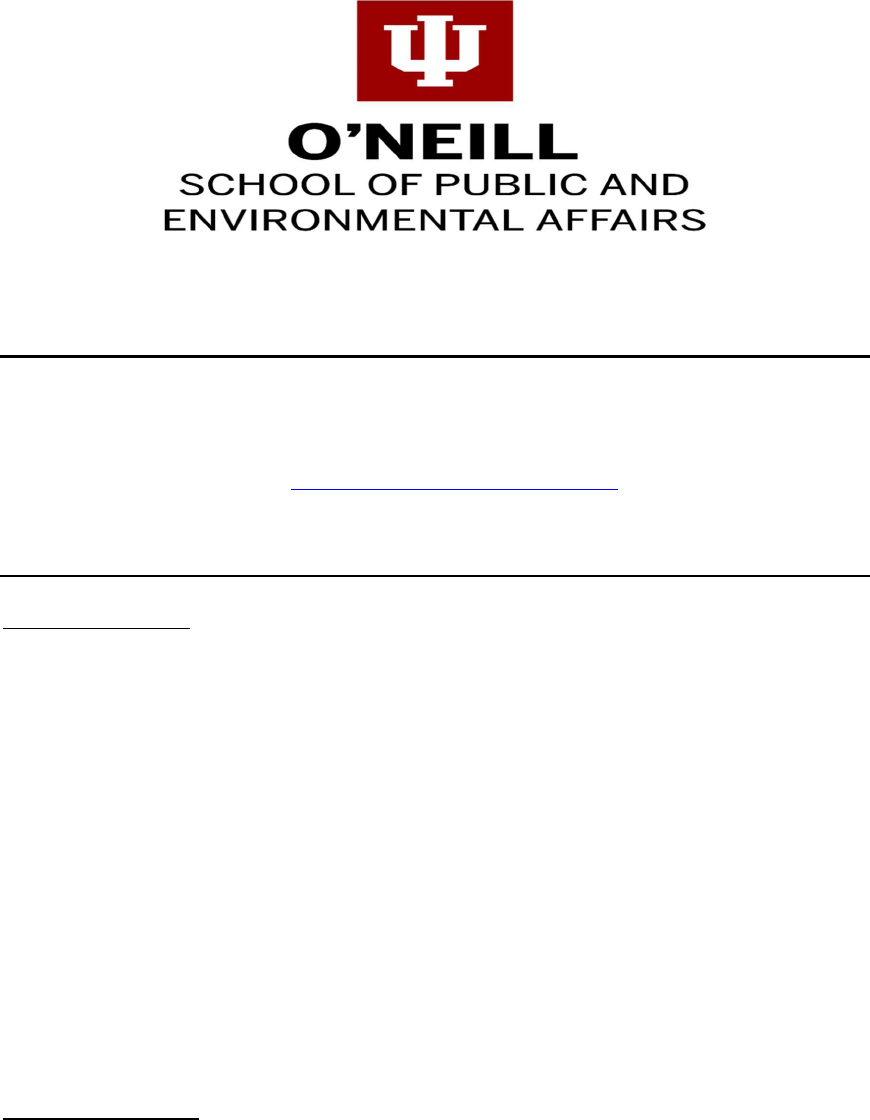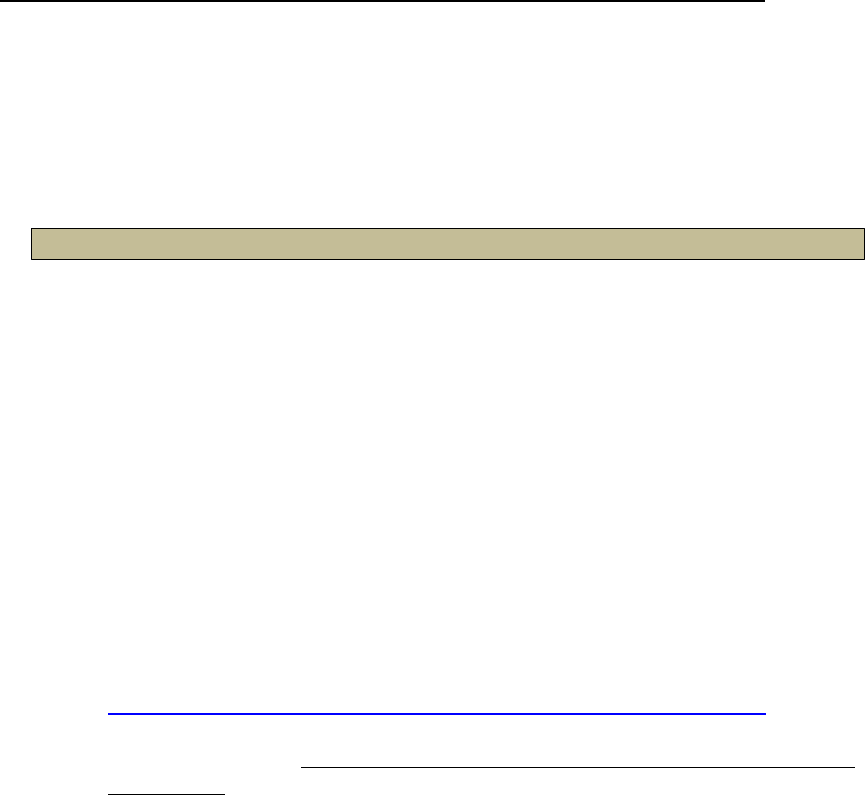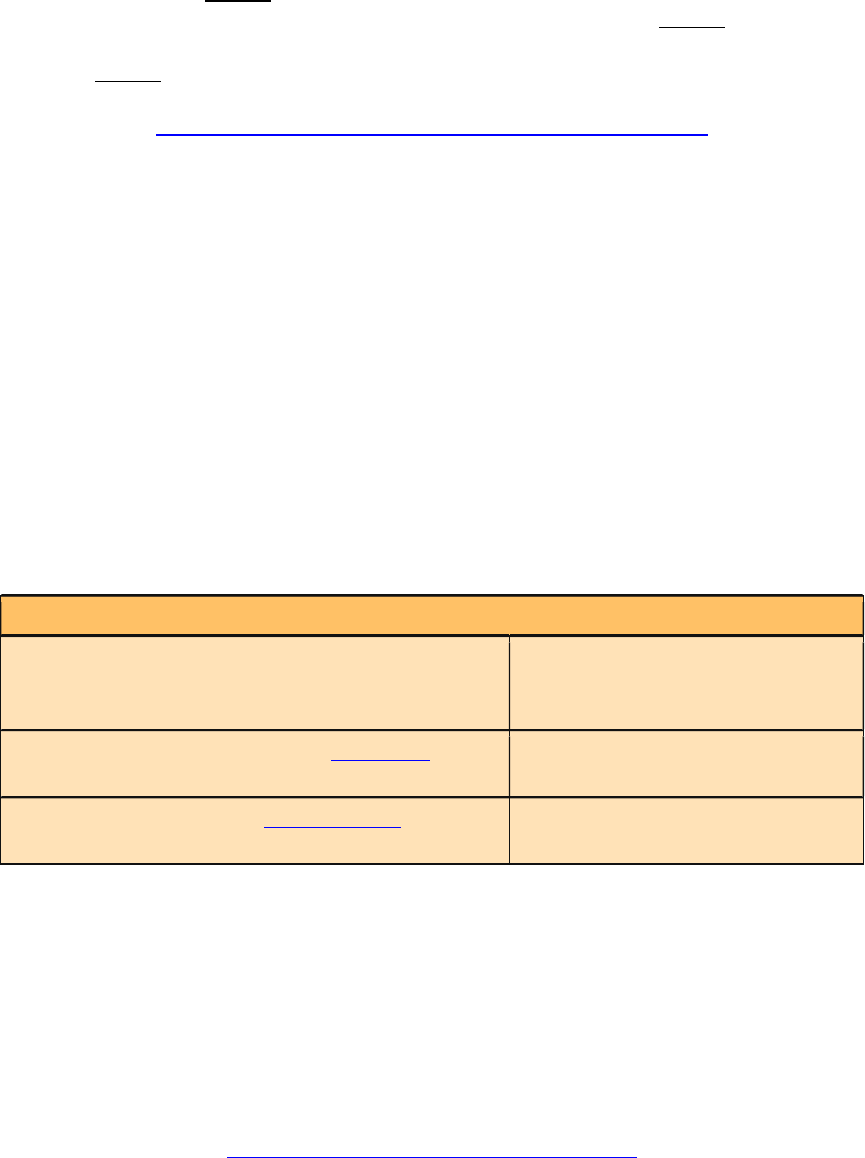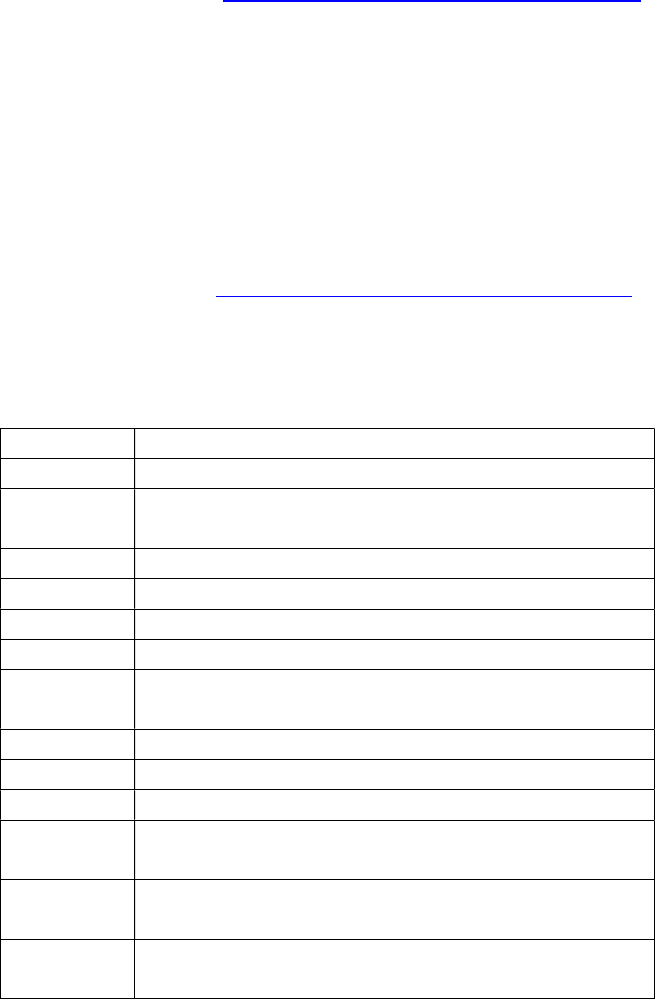
SPEA H124: Overview of the US Healthcare System
Section 6227, Spring, 2022
Instructor: Dawne DiOrio, M.P.A., CPH
Class: T/R, 4:55 – 6:10 p.m.
Room: Swain East 105
Email: Please use Canvas inbox to email me
Office Hours: By appointment
COURSE OBJECTIVES
This is an introductory course designed to present a broad overview of the U.S. health care
delivery system. The course will examine the organization, functions and roles of the system.
Current health care delivery programs are also studied and contemporary problems analyzed.
This course is a requirement for the Bachelor of Science in Health Care Management and Policy
degree at SPEA.
By the end of the course, students will be able to:
Define the components of the U.S. Health Care Delivery System (HCDS);
Specify the roles and functions of each component;
Analyze the performance of the HCDS and identify current problems;
Discuss the role of government and private sector in the function of the system;
Identify key stakeholders and their influences on the HCDS
Identify and discuss current initiatives designed to solve HCDS challenges
REQUIRED READINGS
Textbook:
United States Health Care System: Combining Business, Health, and Delivery, 3
rd
ed.
Austin & Wetle, 2017
ISBN-13: 9780134297798

Available at IU Bookstore and TIS
E-book is fine. Link to buy or rent an e-text is below
https://www.vitalsource.com/educators/products/united-states-health-care-system-the-anne-
austin-victoria-wetle-v9780134297927
Additional readings and videos are required for many chapters provided on Canvas
Recommended Reading:
The American Health Care Paradox, Bradley, Elizabeth and Taylor, Lauren, Public Affairs, 2013
COURSE REQUIREMENTS AND BASIS FOR FINAL GRADE
Success in this course will require students to be organized and responsible for content inside
and outside of the classroom. Some class periods will require the student to independently
complete assigned content such as readings, assignments, view films, etc.
Students are expected to have read the assignments before the class and take an active role in
class discussion.
Tests
Six (6) tests will be given, and will comprise 60% of the final grade. Tests are NOT
cumulative. Content of the tests will be based on lectures, films, and reading
assignments. Format of the tests will include multiple choice and true/false. Tests
MUST be taken during the scheduled time period unless documentation of day of
religious observation or IU athletics participation is provided one week in advance.
Makeup tests will be granted only in the above situations if arranged in advance.
Verification from a physician is required for absence during a test for medical reasons,
and makeup tests will be on a case-by-case basis at instructor discretion.
Final exam – a cumulative final exam will be given at the time set by the Registrar, and
comprises 25% of the final grade
Attendance and Participation- Class attendance, participation in oral presentations, and
homework will comprise 15% of your final grade. Attendance and participation in class
is essential for your understanding of the material and to perform satisfactorily on the
tests. Therefore, attendance at all in-person classes is considered mandatory. Test
sessions do not count toward attendance. It is your responsibility to sign the
attendance roster (or electronically sign via Top Hat) each class session.
If a student needs to miss an in-person class, one absence will be granted without a points
reduction. A student with two unexcused absences will have 15 points/300 possible deducted; a
student with three unexcused absences will have 30 points/300 possible deducted; four
unexcused absences will result in zero attendance points for the semester. These points are not
able to be restored.

The Student Health Center no longer gives visit notes to excuse a class absence, unless
the student has an actual medical problem requiring a doctor visit. Students should
keep their one absence allowed without a points reduction for a time when they feel
too sick to come to class but are not so sick that they need medical attention.
Students sleeping or with heads down during class will not receive attendance points for that
class. At the instructor’s discretion students using electronics in class may not receive
attendance points for that class.
Students who are more than ten minutes late to class should discuss this with the instructor at
the end of class. Students who are more than ten minutes late to class more than once may be
subject to receiving no attendance points for that class at the instructor’s discretion.
Conflicting classes, labs, exams, or study groups, Greek life participation, etc.
Class absences will not be excused if a student has any conflicts with another course or
commitment during this class period such as: they are registered to do a required lab for
another course; a meeting for their fraternity; another course has scheduled an exam or
a study group. The student will need to make the decision which to attend and take the
grade reduction if the conflict falls at a time when an in-person class is scheduled.
Students are expected not to schedule work shifts during class periods.
GENERAL EXPECTATIONS
1. Attendance and participation at class is essential. Experience shows that students
who do not attend class regularly tend to perform poorly, as test questions will
come from lectures/discussions as well as the textbook. If you have to miss a class,
you are strongly advised to copy lecture notes from other students
2. Anyone attending class is expected to conduct him or herself appropriately.
Academic and personal misconduct by students in this class are defined and dealt
with according to the procedures in the Code of Students Ethics. You are
responsible for being familiar with this code and all other relevant SPEA and
University policies.
3. In addition to attending class there is an expectation that you will spend
approximately three to four hours a week studying course material outside of class.
4. Electronics are not allowed in class. Turn off cell phones and electronic devices,
including laptops and tablets, while in class. Do not bring electronic devices to class
on days a test is scheduled. Use of electronics in class will result in not receiving
attendance credit for that class. For further explanation, please see this link:
http://msutoday.msu.edu/news/2014/surfing-the-web-in-class-bad-idea/
5. If you have a disability which requires accommodation, it is your responsibility to
inform the instructor at the beginning of the course. Official supporting documents
are required.
6. Along with information given in class, Canvas will be an important source of
information for the course, including any class cancellation notices, test date
changes and clarifications concerning course expectations. Students are expected to

check their IU email and our Canvas course site at least three times a week and are
responsible for knowing anything communicated through these means. Technical
problems with Canvas, your phone for Duo authentication, or your computer do not
excuse a student from their responsibility to submit assignments, take quizzes, post
in forums, etc. If you are experiencing problems with technology and wish to
receive additional time for assignments, you must contact UITS (University
Information Technology Services) and request assistance. They will assign a ticket
number. If you provide me with the ticket number I will work with you to negotiate
late submission of assignments. Link to their help page:
http://uits.iu.edu/page/abxl Alternatively, students may complete assignments on
campus using one of the IU student computers. You should save all your submission
notices from Canvas in case documentation is requested to give you credit for a
missing assignment.
7. If you have questions about your grade, please inquire in writing no later than one
week of grade posting. Grades in question will not be changed later than one week
after posting by instructor.
8. Late assignments are not accepted for credit unless prior arrangements have been
made with the instructor following the attendance procedure above.
Students with disabilities
Students needing accommodations because of disability will need to register with the
Office of Disability Services for Students (DSS) and complete the appropriate forms
issued by DSS before accommodations will be given. The DSS office may be accessed as
follows:
Office of Disability Services for Students
Herman B. Wells Library, Room W302
http://studentaffairs.iub.edu/dss/
(812) 855-7578
The Office of Disability Services for Students (DSS) assists students with physical, learning, and
temporary disabilities achieve their academic goals. We work with students and instructors to
facilitate accommodation delivery and to link our students to resources – transportation service,
mentoring and internship programs, and housing – essential to success.
Students in Health or Financial Crisis. The Student Advocates Office can help students
work through personal and academic problems including absences for physical or
mental health reasons, as well as financial difficulties and concerns in order to help
students progress towards earning a degree. In addition to advising student on appeal
and financial issues such as financial aid or tuition, they also have emergency funds for
IU students experiencing emergency financial crisis.
https://studentaffairs.indiana.edu/student-advocates/
SPEA ACADEMIC POLICIES

Academic Dishonesty
SPEA faculty do not tolerate cheating, plagiarism, or any other form of academic dishonesty. If
you have not done so, you should read the IUB Code of Student Rights, Responsibilities, and
Conduct, which can be accessed at http://www.iu.edu/~code/code/index.shtml so you will be
sure to understand what these terms mean and what penalties can be issued for academic
dishonesty. Academic dishonesty can result in a grade of F for the class (an F for academic
dishonesty cannot be removed from the transcript). Significant violations of the Code can result
in expulsion from the University.
Any incidence of academic or personal misconduct will result in the maximum sanction,
including dismissal from the course with a grade of “F”. Grades of “F” due to academic
misconduct may not be removed from the student’s transcript with IU’s grade
replacement policy. Violation of any action included in the SPEA Honor Code or any
course policy is included under this Statement. Specific examples include, but are not
limited to, making unauthorized copies of any exam or quiz, signing an attendance
roster for another student, and submitting false information regarding requests for
excused absences.
Plagiarism is using another person’s words, ideas, artistic creations, or other intellectual property
without giving proper credit. According to the Code of Student Rights, Responsibilities, and
Conduct, a student must give credit to the work of another person when he/she does any of the
following:
a. Quotes another person’s actual words, either oral or written;
b. Paraphrases another person’s words, either oral or written;
c. Uses another person’s idea, opinion, or theory; or
d. Borrows facts, statistics, or other illustrative material, unless the information is
common knowledge.
Civility
Civility is important in an academic community to ensure that all parties—students, staff, and
faculty—are working in an environment that fosters achievement of the individual’s and
community’s goals and objectives. Civility requires all parties to demonstrate personal integrity
and conduct themselves in a manner that shows respect, courtesy and tolerance to others.
Examples of discourteous behaviors during class include reading the newspaper, listening to
headphones, talking or laughing with others, chronically arriving late, and so forth. These
behaviors are distracting to the instructor and classmates, and SPEA faculty will address these
problems as they arise. Maintaining and fostering civility inside and outside the classroom is
especially important to SPEA, which is a professional school.
Pursuant to the Indiana University Student Code of Conduct, disorderly conduct which interferes
with teaching, research, administration, or other university or university-authorized activity will
not be tolerated and will be immediately reported to the Office of The Dean of Students for
appropriate disposition which may result in disciplinary action including possible suspension
and/or expulsion from the university.
Communication between Faculty and Students

In order to verify the identity of all parties involved, effective September 1, 2004, all email
communication from current SPEA students to SPEA staff must originate from an Indiana
University email account. For email communication with SPEA faculty, current SPEA students
should refer to course syllabi for instructors’ preferences (Oncourse, Webmail, etc.). This policy
applies to current students only. Instructions for forwarding your IUB email to another account
can be found at:
http://kb.indiana.edu/data/beoj.html?cust=687481.87815.30
Course Withdrawals
Students who stop attending class without properly withdrawing from the class may receive a
grade of F. It is important to withdraw from a course within specified timeframes (see chart
below). Note that withdrawals after Week 12 of a regular session or Week 4 of a summer session
are rarely granted. Poor performance in a course is not grounds for a late withdrawal.
No withdrawal forms will be processed in the Office of the Registrar after the last day of classes.
Any requests for a late withdrawal after the last day of classes must go through the grade appeal
process, but each student should remember that in accordance with campus policy, SPEA does
not permit a student to withdraw from a course if he/she has completed the course requirements.
Grade replacement should be used in this case. To withdraw, obtain a withdrawal slip (DROP/ADD
Form) from the SPEA Student Services window. Instructions for completing it are given on the
form.
Withdrawal Deadlines
Course deleted from record, no grade assigned, 100%
refund
(Advisor signature IS NOT required)
Week 1 (last day)
Withdrawal with automatic
grade of W
(Advisor signature IS required)
Week 2
–
Week 7 (regular session)
Week 2 – Week 3 (summer session)
Withdrawal with
grade of W or F
(Advisor and instructor signatures ARE required)
Week 8
–
Week 12 (regular session)
Week 3 – Week 4 (summer session)
Incompletes
A grade of incomplete (I) indicates that a ‘substantial portion’ of the work in a course has been
satisfactorily but not entirely completed by the student as of the end of the semester. The
incomplete can be given to a student facing a hardship such that such that it would be unjust to
hold the student to the established time limits for completing the work. To be eligible for the
incomplete in a SPEA course, the student’s work must be of passing quality, and the student must
have completed 75% of the course requirements. Poor performance in a course is not grounds
for an incomplete. SPEA follows the campus guidelines in awarding incompletes which may be
accessed at the Office of the Registrar’s website at:
http://registrar.indiana.edu/stu_grades.shtml
Incompletes must be removed within a time period not to exceed one year after the semester in
which the student was enrolled in the course. The incomplete will revert to an ‘F’ if the work is
not completed within the allotted timeframe established by the instructor.

Students Called to Active Duty
SPEA encourages any student who is in the Indiana Military Reserves and is called to active duty
to finish his/her coursework if at all possible. Students who cannot complete their courses have
the option of withdrawing with 100% fee refund, but this request must be made within one week
of being called to active duty. Students who are called to active duty may qualify for an incomplete
(provided that all the above criteria have been met). For further information, please see the Office
of the Registrar’s website at:
http://registrar.indiana.edu/stu_infopoli.shtml
Final Exam Schedule
If a final exam is given, it must be held on the day and time set in the final exam schedule. If an
instructor has changed the final exam date, the student should first consult with the instructor.
Students who have more than three final exams in one day or insufficient time to get from one
exam to another should consult with their instructors to resolve these conflicts. Exams may not
be given in the week before the final exam week. If a student is not able to resolve a final exam
problem with the instructor, the student may report the problem to the Director of
Undergraduate or Graduate programs. The final exam week schedule can be found at the Office
of the Registrar’s website at:
http://registrar.indiana.edu/stu_calsche.shtml
Schedule of Topics (for each class by date, students are referred to the “Each Class” document
in the Syllabus section of Canvas)
Week 1 Introduction to course, Chapters 1 and 2
Week 2 Test 1
Week 3 The payment process, Ch. 3; supplemental
readings Health Care financing
Week 4 The payment process, Ch 4, film
Week 5 Test 2
Week 6 Health care providers, Ch. 5 and 6
Week 7 Offices, clinics and hospitals, Ch 7, Test 3
Week 8 Aging in America, Ch. 8, supplemental readings,
film
Week 9 Test 4,
Week 10 Mental Health Services, Ch. 9
Week 11 Mental Health – film and readings
Week 12 Public Health System, Ch. 10, SPEA Career
Development Office
Week 13 Test 5, Medical Technology and Pharmaceuticals,
Ch. 11
Week 14 Beliefs and Values that Shape Health Care Policy,
supplemental readings and film

Week 15 International Health Care, supplemental readings,
Ch. 14, Test 6
Week 16 Final Exam
The above schedule is subject to limited change in the event of extenuating
circumstances.
